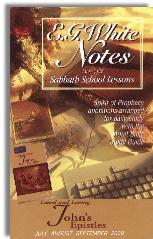|
||||||||||||||
Commentary on "Walking in the Light:
Keeping His Commandments"
Day 7: Friday, July 24, 2009
Overview
This lesson really hones in on the concept that if we’re “walking in the light” we’ll be obedient to the 10 Commandments. It states that God’s law (the 10 Commandments) is being challenged and the issue of worship and true obedience will come to the front even more at the end of the world’s history (in an S.D.A. context, it translates into Sunday laws). It goes on to mention biblical heroes (Joseph, Daniel, etc.) that remained faithful in the face of challenging circumstances. It mentions that Jesus is our prime example and we must follow His lead no matter what. The author then quotes the following:
“John tells us that true love for God will be revealed in obedience to all His Commandments. It is not enough to believe the theory of truth, to make a profession of faith in Christ, to believe that Jesus is no imposter, and that the religion of the Bible is no cunningly devised fable…John did not teach that salvation was to be earned by obedience; but that obedience was the fruit of faith and love.” Ellen G. White, The Acts of the Apostles, p. 563.
There are four discussion questions worth addressing:
- It’s one thing to keep the 10 Commandments; it’s another thing to love people. What’s the difference? Which is easier to do, and why?
- There are two kinds of knowledge—the kind that changes a person and the kind that doesn’t bring about change. What kind of knowledge is the knowledge of God and what kind of changes should it bring to the ones knowing it?
- How can we avoid falling into the trap of trying to earn our salvation by keeping the Commandments, while at the same time avoiding the trap of believing that we can be saved in disobedience to the law?
- What can you, as a class, do to help your local church as a whole better understand what it means to manifest love? Is there even such a thing as corporate love? Picture what the ideal and perfectly loving local church would be like? How well does your local church match up?
Problems
There are many skewed concepts in this lesson because it relies so heavily on S.D.A. theology/assumptions. It’s still focusing on the 10 Commandments as its baseline for obedience when the Bible is so clear that this is no longer our standard of conduct—Christ is. The 10 Commandments were for Israel. In talking about unity of Jews and Gentiles in Christ, Ephesians 2:13-15 states,
“But now in Christ Jesus, you who were far away have been brought near by the blood of the Messiah. For He is our peace, who made both groups one and tore down the dividing wall of hostility. In His flesh, He did away with the law and the commandments in regulations, so that He might create in Himself one new man from the two, resulting in peace.”
When talking about God’s law being challenged, it always comes back to the Sabbath and the coming Sunday laws. When the writer mentions the Bible heroes, they remained faithful to God, not the Sabbath. Jesus is mentioned as the prime example, yet He broke the Sabbath (John 5:18). If this was a moral law, then He sinned. The Bible tells us He was without sin (Heb. 4:15, 2 Cor. 5:21).
The Ellen G. White quote from “The Acts of the Apostles” is in direct contradiction to the Bible. It basically says that it’s not enough to believe, but that true love for God will be revealed in obedience to all His Commandments. The Bible tells us otherwise. See John 3:16, 18; John 3:36; Rom. 3:28; Rom. 4:13-15; Rom. 10:4; Gal. 2:21; Gal. 5:5; Gal. 3:23-26.
In addressing the discussion questions:
- Truly loving people, by our own volition, is impossible, as is keeping the law perfectly. If we have the Holy Spirit, we are able to love them with HIS love through us, and not of our own doing. In this way we are able to keep the New Testament command given by Jesus. It’s an illusion that we really “keep” the Sabbath—trying to do “holy” things during that 24 hour period is not adhering to the Old Covenant laws and fails miserably. It seems easier to complete a 10 Commandment checklist than to put oneself out in love, but the reality is different with Christ’s help.
- We can have all sorts of “religious head knowledge” but not know Christ. Only when we have the Holy Spirit in us and are living a life led by the Spirit does our life change. We must give up any and all illusions that we are doing anything that helps our salvation. A life in the Spirit will produce fruit of the Spirit (Gal. 5:22, 23).
- If one quits worrying about “keeping” any commandment and focuses on a relationship with Christ, the Holy Spirit will do a work in us—it’s Christ that changes our heart and life, not trying to subjectively “keep” a set of rules. That’s an external motivation, not a change from the heart.
- A church focused on others (and Christ) is one that manifests love. Corporate love is what the Bible describes as the “Body of Christ”; each member and department with different roles but working together to spread the gospel and bring others to Christ. A church needs to turn outward to the community’s needs—showing real concern and compassion for them as individuals. If, as an organization, they’re too focused on protecting themselves, the whole point is missed. It always needs to be Christ-centered.
Summary
- All biblical principles are filtered through the S.D.A. lense of 10 Commandment obedience.
- Instead of Christ being the center of S.D.A. beliefs, everything is studied and understood in context of the Sabbath and Ellen G. White, and how it aligns with these key pillars of their theology.
- No one really “keeps” the Sabbath. It’s an arbitrary, subjective illusion. You can’t pick and choose what Old Testament laws you want to keep. If you’re under the law, you have to be under the whole law (Rom. 2:11-13; Gal. 3:13; Gal. 5:1-4).
- We can only truly “know” Christ if we have the Holy Spirit. Change only happens as the Holy Spirit works in us. We have to give up the notion that we can do anything to “help” our salvation or standing before God.
- Focus on Christ and a relationship with Him, and the rest will take care of itself. If you’re worrying about the law, your focus is on the wrong thing.
- To manifest love as a church is to be Christ-centered (not theology centered) and focus on others, not protecting itself. Whenever the focus is off of Christ and others, it becomes ineffective.
Copyright 2008 BibleStudiesForAdventists.com. All rights reserved. Revised July 23, 2009. This website is published by Life Assurance Ministries, Glendale, Arizona, USA, the publisher of Proclamation! Magazine. Contact email: BibleStudiesForAdventists@gmail.com.
The Sabbath School Bible Study Guide and the corresponding E.G. White Notes are published by Pacific Press Publishing Association, which is owned and operated by the Seventh-day Adventist church. The current quarter's editions are pictured above.
Official Adventist Resources
Standard Edition Study Guide Week 4
Teacher's Edition Study Guide Week 4
Easy Reading Edition Study Guide Week 4
Search the Complete Published Ellen G. White Writings


